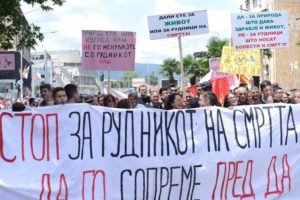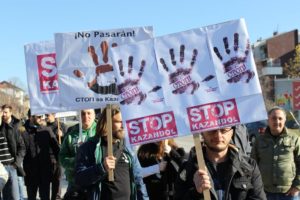Minds of the Movement
An ICNC blog on the people and power of civil resistance
by Sonja StojadinovicMarch 16, 2020
For almost a decade, Macedonians have engaged in a struggle to protect their land and air from mass pollution as a result of foreign direct investment (FDI) in copper, gold, and silver mining in the Balkan state. In 2012, the ruling party VMRO-DPMNE and prime minister Nikola Gruevski introduced the new Law on Mineral Resources, which allowed for faster and less complicated procedures for issuing concessions.
In the five years that followed, more than 80 concessions were issued to open copper, silver, and gold pit mines in various parts of the country. However, after the change in government in late 2016, activists discovered that during Gruevski’s term (2006-2016), there were 378 operational concessions [PDF download]. These concessions are in the south and southeast of North Macedonia, in some of the most ecologically clean agricultural regions with great possibilities for rural tourism, including winter and spa tourism that was already in development.
Nearly every mine that has opened in North Macedonia uses sulfuric acid, cyanide, thallium, and arsenic to extract minerals from the ore. These methods of extraction result in long-lasting water and soil pollution and create millions of square meters of slag, which directly leads into air pollution. The consequences of this pollution include long-term breathing problems, cancer, and mass emigration because of poor environment.

"Stop the mine of death before it stops us." Residents of Pike and Ilovica on a march in 2018. Source: Zdrava Kotlina Facebook page.
Politics and laws against citizens and their homes
In February 2017, when construction in some mines began, the citizens of Gevgelija (a city on the border with Greece) self-organized an initiative called Spas za Gevgelija ("Save Gevgelija") against the opening of a mine on the Kozhuf mountain. This mine, financed by the Canadian company Nevsun Resources LTD, was a threat to the area because it housed a ski center and a regional spa center.
The citizen-led initiative organized a successful municipality referendum, which was followed by successful referenda in Bogdanci and Dojran. Only the referenda in Bosilovo, Valandovo, and Novo Selo—where there were also plans to open toxic mines—failed because of low turnout. However, the next year, the Constitutional Court decided that these referenda were unconstitutional because the concessions were issued by the ministries, not by the municipalities.
Since the court ruling, other citizens’ initiatives like SOS Valandovo, Zdrava Kotlina (“Healthy Valley”), and Youth Against Stuka-Ilovica Mine of Death have organized protests and blockades of regional roads to prevent the opening of mines. The resistance efforts led by Youth Against Stuka-Ilovica Mine of Death targeted a copper mine financed by the Canadian-British company Euromaxx Resources, which was granted two concessions for 20km2 with an annual concession fee of only 55,000€.

"Stop Kazandol mine." Source: Zdrava Kotlina Facebook page.
"War" on the streets and social media
In response, Euromaxx threatened to press charges against the activists involved for allegedly spreading rumors, telling lies, and otherwise negatively affecting the company’s reputation. The activists, who learned from their US and Canada-based counterparts how much damage the mines can cause, were posting this information on social media. This was especially threatening to the mining companies because the Macedonian government concealed information about pollution that these mines can cause.
In the summer of 2017, the activists started a campaign going house-to-house in Novo Selo and Bosilovo to educate people about the dangerous project. The tactics these groups used were mass marches, protests, road blockades, and verbal disruption during public events that the investment company organized.
Facing well-organized opposition both locally and regionally, Euromaxx struck back by trying to bribe activists. And when that didn't work, they threatened activists' lives and those of their family members. Nevertheless, Euromaxx did not succeed.
Accomplishments and promises made, so far
One promising development came in 2018 when various ecological groups declared Lake Dojran and the Ograzden, Kozuf, and Belasica mountains as national parks, in an effort to protect these areas from devastation. While this approach is time-intensive, leveraging this type of pressure could potentially protect other regions from the mass destruction and pollution that mines cause.
During the local election campaigns in the fall of 2017, prime minister Zoran Zaev promised residents of the southeast region that the government would revoke the issued concessions and protect the citizens. This promise was fulfilled in the case of Kozhuf mountain, where the concession for opening the mine was revoked. Then, in 2018, the government revoked Sardich MC’s concession for a gold, silver, and copper mine in Kazandol, and adopted amendments to the detrimental Law on Mineral Resources. The new amendments strictly stipulate that concessions for exploitation will not be granted if the extraction technology uses cyanide and sulfuric acids. Unfortunately however, these legal amendments are not retroactive, so the struggle still continues.
The natural resources in North Macedonia are attractive for FDI, but time and time again these companies have shown that their profits come at the expense of Macedonians’ health and environment. The mines being constructed in the country today yield a low percentage of minerals per ton and the extractions do not last longer than 30 to 40 years—in some cases, maybe less. But the environmental devastation they cause stays forever. So the people of Macedonia will continue to ratchet up pressure on companies and officials to put an end to the destruction—before it’s too late.

Sonja Stojadinovic
Sonja Stojadinovic is an MA student in Southeast European Studies at the University of Graz, Austria. She holds bachelor and master degrees in political science and international relations, both obtained on the Faculty of Law, Skopje, University of St. Cyril and Methodius, Republic of North Macedonia. She is also an activist and well-known columnist for North Macedonian daily newspapers and regional political web sites.
Read More